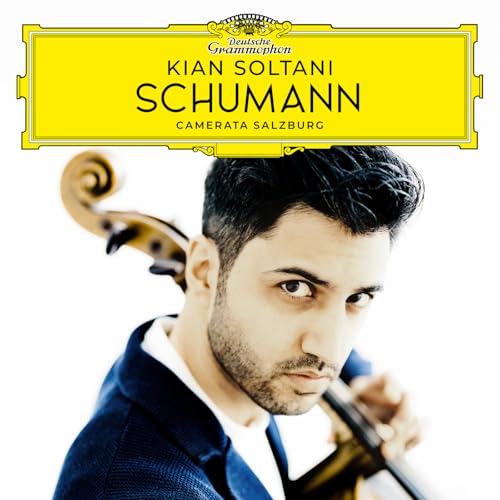
Schumann

















℗© 2024 Deutsche Grammophon GmbH, Berlin
Artist bios
Cellist Kian Soltani emerged from Daniel Barenboim's West-Eastern Divan Orchestra, in which he served as principal cellist. He then began what has become a flourishing solo career. Signed to the Deutsche Grammophon label, he has been exceptionally active as a recording artist, issuing seven albums on the label in three years. In 2024, he released the album Schumann.
Soltani was born in Bregenz, Austria, on June 3, 1992. He is of Iranian background and came from a family of musicians. Soltani took up the cello at age four and showed major talent as a child, enrolling at the Basel Music Academy when he was 12. His teacher there was Ivan Monighetti. Soltani moved on to the Kronberg Academy in Germany's Taunus region, where he benefited from scholarship support from the Anne-Sophie Mutter Foundation and was a member of the Young Soloists' Program. He also studied at Liechtenstein's International Music Academy. Soltani made an impressive debut at age 19 at the Goldener Saal at Vienna's venerable Musikverein society, following it up with first prizes at the Paulo Cello Competition in Helsinki, the Karl Davidoff Competition in Latvia, and the Antonio Janigro Competition in Croatia.
After joining the West-Eastern Divan Orchestra, conductor Daniel Barenboim's pioneering ensemble uniting Israeli and Arab musicians, Soltani took a major role when he appeared as soloist in the Beethoven Triple Concerto, Op. 56, with Barenboim on piano, during the orchestra's 2015 tour; they performed at the Lucerne and Salzburg Festivals and the Waldbühnen summer concert in Berlin. That led to other solo appearances at the BBC Proms and with such groups as the Frankfurt Radio Symphony Orchestra, Tonhalle Orchester Zürich, and the Orchestre de Paris. Soltani took a solo role in Strauss' Don Quixote under Barenboim in the West-Eastern Divan's 2017 tour and made a series of major appearances in Germany, Austria, and France during the 2017-2018 season.
In 2017, he was signed to the Deutsche Grammophon label, and early in 2018, he released his debut album, Home, featuring works by Schubert and Schumann as well as his own folk song settings and those by Iranian composer Reza Vali. Soltani continued to be prominently featured in West-Eastern Divan Orchestra concerts into the early 2020s, and his solo career has grown as he has made concerto appearances with such groups as the Munich Philharmonic, Accademia Nazionale di Santa Cecilia, and the ORF Vienna Radio Symphony. His chamber music appearances have been notable as he has collaborated with Daniel and Michael Barenboim in trios, and with other players, including Lahav Shani and Renaud Capuçon. In 2020, Soltani released two albums, one of Beethoven's piano trios with the Barenboims and one of Dvořák's Cello Concerto in B minor, Op. 104, with the Staatskapelle Dresden. Soltani returned with the film music album Cello Unlimited in 2021. That was followed by Schumann in 2024, on which Soltani conducted the Camerata Salzburg from the cello. ~ James Manheim
The Camerata Salzburg is a chamber orchestra associated with Mozart's music and the Mozarteum University in the composer's hometown of Salzburg. Inspired by various conductors, the group has experimented with historical performance practice and with music as far forward in time as that of Arnold Schoenberg. The Camerata Salzburg has a recording catalog dating back well into the LP era. In the 2000s, it has recorded for major labels including Decca and Deutsche Grammophon, where it backed cellist Kian Soltani on the album Schumann in 2024.
The Camerata Salzburg was founded in 1952 by Bernhard Paumgartner, a Viennese conductor and musicologist who specialized in Mozart's music. The group's original name was Camerata Academica des Mozarteums Salzburg, later shortened to Camerata Academica Salzburg and finally, by the late 2010s, to Camerata Salzburg; the first album issued under the short name, Mozart: Horn Concertos 1-4 (2019), featured hornist Felix Klieser. At first, the group's membership comprised Paumgartner's students and fellow faculty members at the Salzburg Mozarteum University. Paumgartner remained conductor until his death in 1971 and led the group in a cycle of Mozart piano concertos with pianist Géza Anda in the '60s. He was succeeded three years later by Antonio Janigro, who introduced subscription concerts in Salzburg. Under Janigro and violinist-conductor Sándor Végh, principal conductor from 1978 until his own death in 1997, the group's activities steadily took on a more international scope. In the '80s, the group recorded with pianist András Schiff. An early digital recording was one of Vivaldi's Die vier Jahreszeiten ("The Four Seasons") in 1988.
Végh's influence on the Camerata Salzburg was fundamental, but the group has also been shaped by later conductors and by guest artists. Roger Norrington, who has a strong historical performance orientation, served as principal conductor from 1997 until 2006. Violinist Leonidas Kavakos held the title of principal guest artist in the early 2000s and served as artistic director from 2007 to 2009. France's Louis Langrée became principal conductor in 2011 and served until 2016. He was the last principal conductor to date; since then, the orchestra members make artistic decisions, with guests stepping in when a conductor is necessary. Those guests are a prestigious group that includes Franz Welser-Möst, John Eliot Gardiner, Philippe Herreweghe, and Theodor Currentzis; guest instrumentalists and singers are similarly notable and include violinists Janine Jansen and Anne-Sophie Mutter, pianist Vikingur Ólafsson, and tenor Rolando Villazón. The orchestra appears not only at the Mozarteum but frequently in Vienna at such venues as the Konzerthaus, and also in cities beyond Austria. It has continued to record frequently for such labels as Deutsche Grammophon, Decca, and Orfeo. On Deutsche Grammophon, the Camerata Salzburg appeared on the 2022 album Hélène Grimaud Plays Valentin Silvestrov, followed on the same label by 2024's Schumann, featuring cellist Kian Soltani. ~ James Manheim
Customer reviews
How are ratings calculated?

